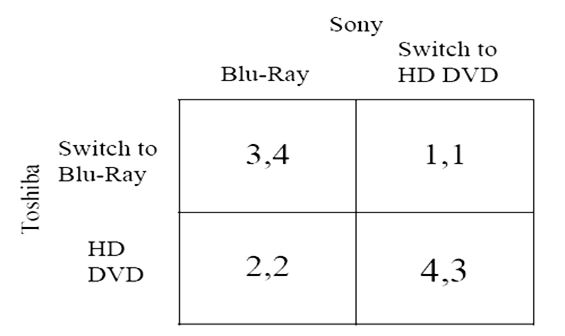The various colonial powers that ruled Africa into the 20th Century included all except:
A. Italy
B. France
C. Netherlands
D. Britain
C
You might also like to view...
The traditionalistic/individualistic political culture is dedicated to unlimited governmental action
Indicate whether the statement is true or false
What is (are) the expected outcome (outcomes) of the game?
In 2006, there were a number of media reports about the next generation of DVD players, which produce much clearer picture and sound than that produced by current machines. However, there are two competing formats, Blu-ray (Sony) and HD DVD (Toshiba). Both are affiliated with certain movie studios, which have agreed to release their movies in one or the other of the new formats. This creates a problem for the producers of this new technology—they all want their own version to win out, but by competing they make it entirely likely that most consumers will sit back and wait until (a) one of the formats is a clear winner or (b) a newer, even better, method of supplying movies is developed by someone else. If the latter happens, both Sony and Toshiba lose out.
Imagine that both companies have developed a new product, but with different formats. If one of the companies would be willing to switch quickly (assume that copyright laws would allow it to produce something similar), that company would lose some time and market share but be able to get into the market. Consumers would be more willing to buy the new technology, and both companies would make more money. If neither company is willing to coordinate with the other, they end up in a war of attrition, with fewer customers. This is shown in the game below.

A. Because there was only one Nash equilibrium, I would expect both players to choose the strategies that constitute that equilibrium.
B. Because there was more than one Nash equilibrium, it is difficult to say what the actual outcome of the game would be.